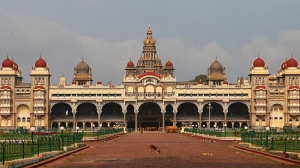Wisdom beyond scriptures
In these recessionary times in the media an editor who dares to take umbrage at big-ticket advertisements of any kind, risks not merely l...

In these recessionary times in the media an editor who dares to take umbrage at big-ticket advertisements of any kind, risks not merely losing his job, but even forfeiting his provident fund. So how does one react to the two back-to-back advertisements issued on behalf of the BJP last week, saluting the martyrs of the current conflict in Kargil in one and claiming, in the second, that Syama Prasad Mookerjee, its former president, was the first martyr in India8217;s Kashmir cause?
The advertisement matched in its obscenity the hoardings put up by sundry Congressmen 8212; around Janpath, all facing No. 10 8212; expressing solidarity with Indian jawans. It also evoked a sharper reaction than almost any other political move from any party within this paper8217;s traditionally nationalistic readership, bringing in a flood of letters and e-mails asking how the BJP had forgotten the sacrifice of more than a thousand Indian soldiers who died reclaiming and saving two-thirds of Kashmir from the raiders and the Pakistani army in1947-48. But it was ironical in the manner it reminded us of how the BJP8217;s ideological thought on Kashmir has evolved. Or, to be fairer, how responsibility of being in power teaches you to distance party ideology from national interest.
For the BJP, Syama Prasad Mookerjee was certainly the first martyr to its ideological position on Kashmir. He went there to question Kashmir8217;s special constitutional status, defying government orders that barred outsiders from entering the state without permission. He was arrested and died mysteriously in custody. But what has happened to the ideology he sacrificed his life for? Not only has the BJP forgotten all about its old demand of abolishing Kashmir8217;s special status, its ideologues are now strongly pleading that we accept the Line of Control as a de jure international border.
We must not quibble with these ideological shifts. These are sensible, pragmatic ideas that show an open mind, willing to think afresh, to break out of the scriptural bondage. Except that fartoo many similarly sensible and pragmatic people in the very recent past have been abused and maligned for saying pretty much similar things. Forget the B.G. Vergheses and the Ajit Bhattacharjeas, even the BJP8217;s very own Jaswant Singh paid dearly for as much as hinting, in the course of a characteristically complex formulation in a television interview, that the LoC could be a starting point for future negotiations. He was immediately reminded of the holy resolutions of Parliament and the Sangh Parivar8217;s own favourite slogan Kashmir hamaara hai, saare ka saara hai Kashmir is ours, all of it is ours.
If that was the refrain then, the same people now chant the mantra of the LoC. There is no nostalgia for Mirpur or Muzafarabad, Gilgit or Skardu or for absorbing within India another five million Kashmiri Muslims. Actually it was never there. India was quite content with the part of Kashmir it had. The BJP8217;s saare ka saara8216; slogan was just a slogan to embarrass the Congress and fire theimagination of the Swayamsevaks. The BJP, by and large, shared the Congress party8217;s lazy, complacent belief that the LoC as international border was a fait accompli, sanctified by the Simla Agreement. Until the fires broke out along the craggy Kargil ridgelines.
It is risky at this point to guess how the Kargil crisis would end. But it is safer to predict what will happen once it is over, irrespective of whether it leads to a larger war or its likely outcome 8212; an Indian victory of sorts. It would only lead to a wider, more substantive round of talks over the status of Kashmir. It is also likely that when that happens the BJP would still be in power and almost certainly in a stronger position than now, possibly riding the wave of a post-war euphoria. It will then have to forget Article 370, the rest of Kashmir and the acknowledgement of the LoC as the border will be its basic negotiating position.
There is nothing wrong with that. In fact, it is just as well that this move, like the Lahore bus ride, isalso made by a BJP prime minister, so no lesser mortal is accused of selling our national interest. But the larger lesson of the perils of relying on scriptures and mantras as policy must not be overlooked, particularly by the BJP.
Even several months after Pokharan II its leaders were making loud statements on not surrendering to international pressure on the CTBT. Yet, at the very same time, the government8217;s leading lights were gently persuading editors and security analysts, we, the perennial mugs in this game, to create public opinion to accept the CTBT. At the same time they were drafting speeches for the Prime Minister screaming defiance of the CTBT. They were also pressing him to upbraid Jaswant Singh for making the quot;irresponsiblequot; LoC slip. Who else is telling him now to take such categorical positions on quot;third party interventionquot; in Kargil, on ruling out any quot;secret dealquot; with Pakistan on a withdrawal?
If we are reaching out to the whole world, notably Washington, to quot;leanquot; on Pakistan, if weare opening the doors of South Block on a Sunday to embrace a mere deputy assistant secretary of defense at the Pentagon, if we celebrate every tiny bit of criticism of Pakistan from that White House bigmouth James Rubin, is it smart on our part to keep repeating the same quot;no third party, no foreign intervention, Kargil is a bilateral issuequot; mantra? How will you make a deal with Pakistan on Kargil if not secretly? On the floor of Bombay Stock Exchange? Or at another banquet at the Lahore Fort, televised live by Pramod Mahajan8217;s Doordarshan?
Old lines have a habit of coming back to haunt you so it is prudent to pause and think before repeating them. As India8217;s first truly non-Congress government, the BJP is in a unique position to look at many of the old, classical Nehru-Gandhi formulations on foreign and security policy afresh. But, besides the Pokharan blip, it hasn8217;t dared to be even as different as Narasimha Rao was in reaching out to Israel and South Africa. It is allowing itself to become a prisoner ofnot only its own scriptures but also the ones it has inherited from the Congress.
The LoC as border, for example, is not a new idea. This is how Indira Gandhi read the Simla accord. She miscalculated in believing that Bhutto was sincere, would last a long time, the accord will strengthen Pakistan8217;s democracy and therefore promise durable peace. She underestimated Pakistan8217;s inherent instability and therefore the need for formal international endorsement for the accord that would have formally consigned the UN resolutions on Kashmir to the trash-can of history. Even a Pakistan as unstable and unpredictable as today8217;s would have found it difficult to repudiate such an accord.
This has to be remembered when the next round of Kashmir talks takes place, with or without a larger war, when we search for a more lasting solution, probably underpinned on the LoC as the border, with other innovations to accommodate the aspirations of the separated Kashmiris. We may not like mediation or intervention. But one more,purely bilateral accord, with no international guarantees of Pakistani compliance, won8217;t be worth the cost of either the quot;war of sortsquot; we are now fighting, or the larger war that seems to be at our doorstep. It is therefore necessary to temper our own formal responses and the public opinion. For that new reality, now.
- 01
- 02
- 03
- 04
- 05































